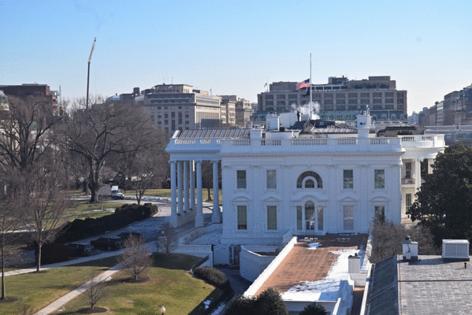White House meets college leaders about preferential funding plan
Published in News & Features
WASHINGTON — White House officials met Friday with the leaders of several colleges about the Trump administration’s proposed preferential funding compact, according to a person familiar with discussions, after rejections of the accord by a number of elite schools showed the idea is struggling to gain traction.
Three of the schools invited to join the meeting — Arizona State University, the University of Kansas and Washington University in St. Louis — had not received the White House’s original Oct. 1 overture about the compact. Four other invited schools had gotten that initial offer to join the compact, but have not yet issued a public declaration of whether they’d sign on. Those schools include the University of Arizona, Dartmouth College, Vanderbilt University, and the University of Texas Austin.
One college, the University of Virginia, rejected the deal on Friday but was invited to the meeting. It was not clear whether UVA had declined before or after the meeting was held.
It was not clear whether representatives of all eight of the schools were in attendance, but the person familiar with the matter said all had acknowledged the invitation and were expected to participate.
The meeting was led by White House senior adviser May Mailman, a central figure in the administration’s higher education policy; Vincent Haley, director of the White House Domestic Policy Council; and Education Secretary Linda McMahon, according to the person.
The Compact for Academic Excellence in Higher Education promises universities preferential treatment in federal funding decisions in exchange for commitments to a slew of the administration’s policy priorities, including banning diversity, equity and inclusion (DEI) programs, limiting international student enrollment, freezing tuition and hiring more conservative faculty.
Friday’s meeting comes after a week of pushback to the compact, which was initially sent to nine elite universities. Last week, the Massachusetts Institute of Technology became the first school to reject the deal outright, followed by Brown University this week. On Thursday, the University of Pennsylvania and the University of Southern California also declined to sign the compact, though they offered substantive feedback.
The administration plans to update the compact using feedback from interested schools before recirculating a new draft by November 21, according to the person familiar with the matter. The White House plans to send out that revised compact to interested schools.
The compact is the White House’s latest move in an aggressive campaign to upend higher education, which has seen billions of dollars in research grants frozen along with dozens of civil rights investigations related to accusations of antisemitism on campuses and alleged discrimination in admissions and hiring.
So far, that campaign has yielded mixed results: Columbia University, Penn and Brown all agreed to settle with the administration to restore crucial funding, while Harvard University continues to hold out on a deal and rack up victories in court.
_____
With assistance from Derek Wallbank.
_____
©2025 Bloomberg L.P. Visit bloomberg.com. Distributed by Tribune Content Agency, LLC.







Comments